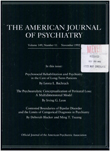Paradoxical patient reactions to psychiatric life support: clinical and ethical considerations
Abstract
The authors describe cases illustrating two types of high-risk and especially difficult suicidal psychiatric inpatients. In the first case, a suicidal patient reacted to psychiatric life support measures (maximum observation) with increasingly life-threatening acting out, necessitating a difficult, seemingly paradoxical staff decision to withdraw life support. In the second, a patient felt to be improving killed herself when life support was withdrawn. The authors argue that there are clinical limits to psychiatric life support and an appropriate goal of psychiatric treatment is to maximize the chances for patient survival, rather than to attempt to guarantee such survival.
Access content
To read the fulltext, please use one of the options below to sign in or purchase access.- Personal login
- Institutional Login
- Sign in via OpenAthens
- Register for access
-
Please login/register if you wish to pair your device and check access availability.
Not a subscriber?
PsychiatryOnline subscription options offer access to the DSM-5 library, books, journals, CME, and patient resources. This all-in-one virtual library provides psychiatrists and mental health professionals with key resources for diagnosis, treatment, research, and professional development.
Need more help? PsychiatryOnline Customer Service may be reached by emailing [email protected] or by calling 800-368-5777 (in the U.S.) or 703-907-7322 (outside the U.S.).



